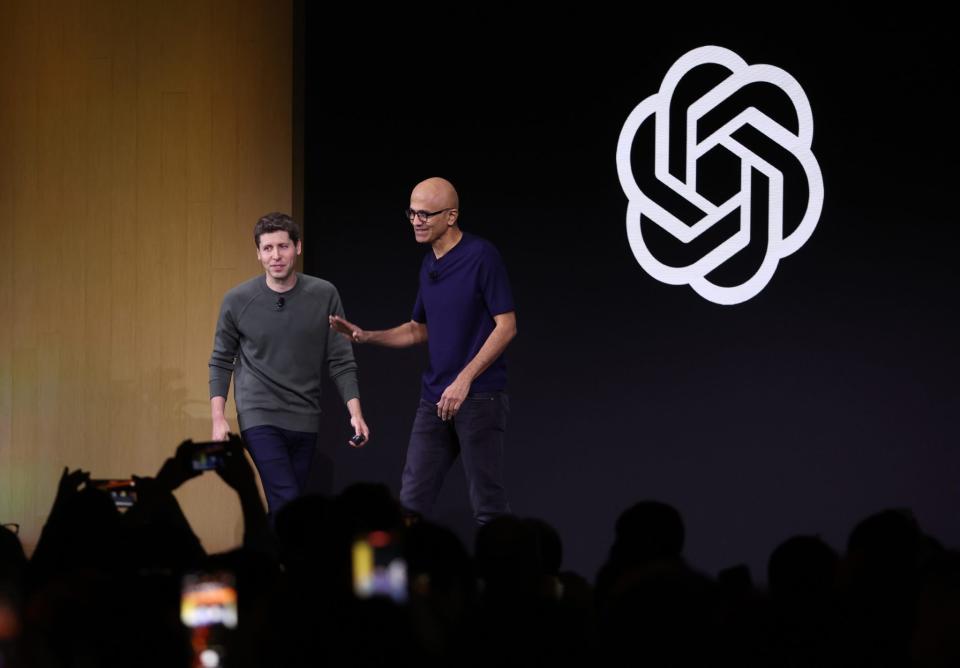It’s for the best that Microsoft and Apple won’t be observing OpenAI’s board meetings

OpenAI’s board meetings were about to get really weird, with not one but two major customers and partners sitting in as observers. But that awkward situation has suddenly been averted.
Microsoft, OpenAI’s biggest partner and investor, has been a board observer since last year’s leadership crisis, in which Microsoft and everyone else were shocked by OpenAI's board abruptly and briefly firing CEO Sam Altman. And, as I wrote last week, Apple, which plans to integrate ChatGPT into iOS, was reportedly about to get the same privilege.
However, it emerged today that Microsoft has dropped its observer role with immediate effect, and Apple won’t take one either. Microsoft reportedly told OpenAI in a letter that its seven months observing meetings “provided insights into the board’s activities without compromising its independence,” and the role was no longer necessary because “we have witnessed significant progress from the newly formed board and are confident in the company’s direction.”
Instead of having board observers, OpenAI said it will now just hold regular meetings with its strategic partners and investors. This seems a far more sensible approach, for multiple reasons.
Firstly, while European antitrust officials earlier this year dropped a probe into Microsoft’s relationship with OpenAI—they conceded Microsoft had not taken control of its partner—there’s now a broader EU review taking place, covering strategic investments and partnerships across the entire AI industry. Regulators in the U.K. and U.S. are also paying close attention. This is not a time for Microsoft and OpenAI to appear overly cozy.
Secondly…well, here I’m going to hand things over to Data Sheet reader JE, who wrote me this in response to last week’s essay about the subject:
“The issue of letting major customers sit in on board meetings would seem to raise all kinds of issues. As the retired chair of the board of a publicly traded company, I would have real concerns about how we could have functioned with customers or even large shareholders sitting in on what should be candid, serious and confidential discussions…I question how this ‘observation’ can be helpful if open-ended. Having input and discussion for a defined topic and time in meetings with customers is fine; attending meetings as an observer or participant is not.”
Doubly so if two competing customers like Microsoft and Apple are both in the room, I imagine.
Since we’re on the subject of AI, Elon Musk’s xAI startup has decided to build its own data center systems rather than continuing its server rental agreement with Oracle. The Information had the scoop and the man himself confirmed it on X, where he said xAI’s only chance of catching up with more established rivals was to move faster than them.
“Oracle is a great company…but, when our fate depends on being the fastest by far, we must have our own hands on the steering wheel, rather than be a backseat driver,” Musk tweeted.
Meanwhile, the U.S. has for the first time accused another country of using generative AI in a foreign influence campaign, Reuters reports. You will be shocked to hear that Russia is the alleged miscreant—a Russian organization apparently designed an AI-powered bot farm to spread disinformation in the U.S. and elsewhere.
Finally, Fortune AI maestro Jeremy Kahn has a new book out! It’s called Mastering AI: A Survival Guide to Our Superpowered Future and I for one can’t wait to read it. We published an excerpt yesterday—which appropriately focuses on AI’s potential for surreptitiously influencing people—and you can also read Jeremy’s own rundown of the book’s key themes in yesterday’s Eye On AI essay.
More news below.
David Meyer
Want to send thoughts or suggestions to Data Sheet? Drop a line here.
This story was originally featured on Fortune.com

 Yahoo Finance
Yahoo Finance 